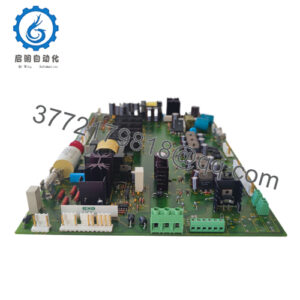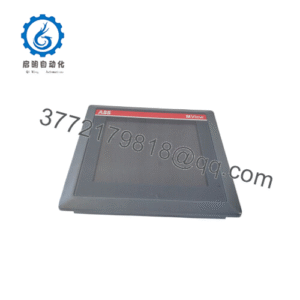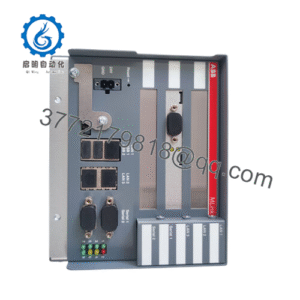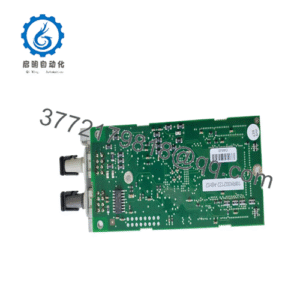Description
| Model | DSTYW121 |
| Brand | ABB |
| Type | Advanced Wireless Industrial Timing Synchronization Module |
| Internal Oscillator | OCXO (Oven-Controlled Crystal Oscillator), ±1 ppm over -30°C to +75°C |
| Supported Timing Protocols | IEEE 1588 PTP (wireless profile, v2.1), NTPv4, SNTP, PPS input/output |
| Wireless Interfaces | Dual-band Wi-Fi 6 (2.4GHz/5GHz, 802.11 a/b/g/n/ac/ax) |
| Cellular Connectivity | LTE-M/NB-IoT (Cat M1/NB2), 5G-ready |
| Synchronization Outputs | 6 x programmable pulse outputs (1PPS, 1PPM, custom intervals) |
| Synchronization Inputs | 4 x pulse inputs (PPS, GPS, wired reference) |
| Wired Network | 2 x 10/100/1000 Mbps Ethernet ports (redundant) |
| Timekeeping Resolution | 10 microseconds |
| Wireless Sync Accuracy | <5 milliseconds (Wi-Fi), <20 milliseconds (cellular) |
| Processing Power | Dual-core 32-bit microcontroller with dedicated timing coprocessor |
| Memory | 4MB RAM, 64MB flash storage |
| Power Supply | 24V DC ±15%, optional 7.2V lithium battery, or solar input |
| Power Consumption | <10W (wired power), <50mW (battery mode, deep sleep) |
| Battery Life | Up to 8 years (with low-power sync intervals) |
| Operating Temperature Range | -40°C to +80°C (-40°F to +176°F) |
| Enclosure Rating | IP66 (outdoor), NEMA 4X |
| Mounting Type | DIN rail, pole mount, wall mount, or solar panel integration |
| Dimensions | 100mm x 140mm x 60mm (W x H x D) |
| Protection | Advanced EMC immunity, 10kV surge protection, reverse polarity protection |
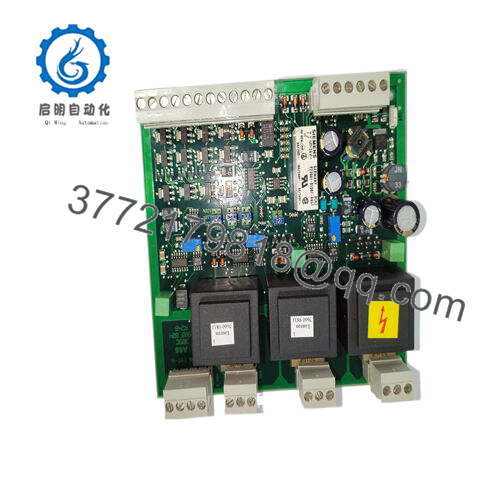
DSTYW121
The DSTYW121 is an advanced wireless industrial timing synchronization module designed to provide enhanced precision timekeeping and synchronization capabilities for demanding industrial environments. As an upgraded successor to the DSTXW110, it retains the flexibility of wireless connectivity while introducing significant improvements in timing accuracy, wireless performance, and feature set. This module is engineered to meet the needs of larger, more complex distributed systems that require reliable synchronization without the constraints of wired connections.
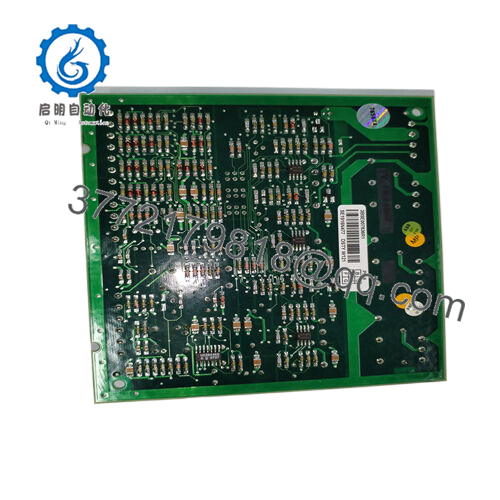
DSTYW121
This module integrates seamlessly with advanced industrial control architectures, including large-scale sensor networks, IIoT platforms, and geographically dispersed infrastructure. Its design prioritizes enhanced wireless range, improved timing precision, robust security, and industrial-grade durability, making it suitable for both indoor and outdoor applications in harsh environments. For system architects and engineers working with complex distributed systems, the DSTYW121 offers significant value through its superior synchronization accuracy, extended wireless capabilities, and advanced management features, enabling reliable timing across the most challenging industrial wireless environments.
Main features and advantages:
The DSTYW121 delivers exceptional wireless timing performance with its high-stability OCXO (Oven-Controlled Crystal Oscillator) providing ±1 ppm accuracy over -30°C to +75°C—five times more precise than its predecessor. This enhanced stability ensures consistent synchronization across larger wireless networks, with a timekeeping resolution of 10 microseconds that supports precise event correlation and control coordination. The module supports an advanced hybrid synchronization approach, combining wireless timing protocols with multiple reference inputs, enabling it to operate as a high-precision wireless master or integrate with existing wired timing infrastructure like the DSTA131 for enhanced accuracy.
Wireless connectivity is a standout feature of the DSTYW121, featuring dual-band industrial-grade Wi-Fi 6 (2.4GHz and 5GHz) with support for IEEE 802.11 a/b/g/n/ac/ax standards, ensuring superior performance in congested industrial RF environments. It includes enhanced cellular connectivity (LTE-M/NB-IoT and 5G-ready) for applications requiring synchronization across extremely large areas. The module implements advanced wireless timing mechanisms including precision timestamping, adaptive frequency hopping, and interference detection, minimizing latency and jitter even in challenging RF conditions. Wireless sync accuracy is improved to <5 milliseconds (Wi-Fi) and <20 milliseconds (cellular) compared to previous generations.
Hardware highlights include a rugged, weather-resistant design with an IP66 rating for outdoor installations and an extended operating temperature range of -40°C to +80°C, ensuring reliable operation in extreme industrial environments. The DSTYW121 features advanced electromagnetic compatibility (EMC) protection and robust wireless security protocols (WPA3-Enterprise, 802.1X authentication, and end-to-end encryption) to prevent unauthorized access and ensure data integrity. It includes comprehensive diagnostic capabilities with real-time wireless signal analysis, synchronization status monitoring, and predictive fault detection, enabling proactive troubleshooting of connectivity issues. The module offers flexible power options, including 24V DC wired power, optional high-capacity battery operation, and even solar charging support for remote, off-grid installations.
Application areas:
In industrial environments where wireless timing synchronization demands higher precision and greater reliability, the next generation of wireless timing modules must address evolving challenges. From large-scale smart grids with dispersed monitoring points to complex manufacturing facilities with moving assets, these applications require wireless timing solutions that offer improved accuracy, extended range, and enhanced resilience against interference. This is where the DSTYW121 steps in, building on the capabilities of the DSTXW110 to deliver advanced wireless timing synchronization for more demanding industrial scenarios.
The DSTYW121 is ideally suited for large-scale renewable energy complexes, such as wind farms spread across vast territories, where it synchronizes turbine controllers, condition monitoring systems, and grid connection equipment with enhanced precision. In busy logistics hubs with numerous automated guided vehicles (AGVs) and robotic systems, it provides microsecond-level timing synchronization to ensure coordinated movement and collision avoidance. Smart city infrastructure, including traffic management systems, environmental monitoring networks, and public utility grids, leverages it to maintain consistent time alignment across diverse, geographically dispersed assets. By addressing advanced wireless timing challenges—such as improved accuracy over longer distances, better interference resistance, and seamless integration with IIoT platforms—the DSTYW121 delivers superior wireless synchronization for industrial systems where precision and reliability are paramount.
Related products:
DSTA131 – Precision timing module that serves as a high-accuracy master clock for the DSTYW121 in hybrid systems.
DSDX452 – Advanced communication gateway that integrates wireless timing data from the DSTYW121 into enterprise networks.
DSPS24-8 – Redundant power supply unit optimized for powering the DSTYW121 in critical wired installations.
DSBAT200 – High-capacity lithium battery pack with 8-year life for extended untethered operation.
DSANT200 – Directional high-gain antenna for extending the wireless range of the DSTYW121 up to 5km.
DSHMI300 – Advanced HMI panel that displays detailed wireless synchronization metrics from the DSTYW121.
DSLOG300 – High-performance data logger that uses precise time stamps from the DSTYW121 for analysis.
DS solar 100 – Solar charging module for remote, off-grid installations of the DSTYW121.
Installation and maintenance:
Before installing the DSTYW121, perform a comprehensive site survey using the manufacturer’s RF planning tool to identify optimal placement, considering obstacles, interference sources, and optimal antenna positioning. For outdoor installations, ensure the module is mounted in a location with unobstructed sky view if using GPS augmentation, and consider thermal management in extreme temperature environments.
When deploying the DSTYW121, configure the wireless parameters based on site survey results, selecting optimal channels and transmission power to maximize range and minimize interference. For battery-powered installations, utilize the module’s adaptive power management features to balance synchronization frequency with power consumption. In hybrid systems, configure redundant synchronization paths with automatic failover between wireless and wired references. Implement the advanced security features including certificate-based authentication and encrypted communication channels to protect timing data.
For maintenance of the DSTYW121, utilize the module’s advanced remote monitoring capabilities to perform weekly checks of wireless signal quality, synchronization accuracy, battery health (if applicable), and interference levels. Conduct quarterly physical inspections of outdoor installations to ensure mounting hardware remains secure and enclosures are free from debris or water intrusion. Verify timing accuracy quarterly using a reference clock or the DSTEST300 tool, leveraging the module’s calibration features to maintain precision over time.
Firmware updates can be applied remotely over-the-air (OTA) or via wired Ethernet during scheduled maintenance windows. The module supports dual-image firmware updates with automatic rollback capability to ensure uninterrupted operation. Maintain detailed records of signal strength trends, synchronization performance metrics, and maintenance activities to optimize wireless network performance and plan future expansions.
Other ABB product models:
ABB FI830F
ABB FI840F
ABB FPR3203526R1002A
ABB FPR3600227R1202-J 07KR31
ABB FS300R12KE3/AGDR-72C
ABB FS450R12KE3/AGDR-71C
ABB FSA80
ABB G2000A5.7ST
ABB GCC960C102 3BHE033067R0102
ABB GDB021BE HIEE410455P104
ABB GDB021BE01 HIEE300766R0001
ABB GDC801B 3BHE051592R0101
ABB GDC801B102 3BHE051592R0102
ABB GFD233A 3BHE022294R0101
ABB GFD563A102 3BHE046836R0102
ABB GFD563A102 3BHE046836R0102
ABB GFD563A102 3BHE046836R0102
ABB GFD563A102 3BHE046836R0102
ABB GFD563A102 3BHE046836R0102
ABB GJR5252300R0101 07AC91
ABB GJR5252300R3101 07AC91
ABB GJR5252300R3101 07AC91
ABB GJR5253100R0270 07KT98
ABB GLBS200516R
ABB GMKP2800-32IBY
ABB GNT0104500R0002
ABB GRBTU 3BSE013175R1
ABB GVC750BE101 3BHE009681R0101 GVC750BE101 3BHE013088R001 5SHY3545L0010
ABB HAI805
ABB HBFFAEAGNBA1BAA11G
ABB HBS01-EPD
ABB HBS01-EPD
ABB HC800
ABB HESG112548R12
ABB HESG324430R11/B 216GD61A
ABB HESG324442R0112
ABB HESG447419R0001 70EA05a-E
ABB HIEE205011R0002(UNS3670A)
ABB HIEE205014R0001 UNC4673A, V1
ABB HIEE205014R1 HI220856-312/20 UNC4673AV1
ABB HIEE300698R0001(KUC321AE)
ABB HIEE300888R0002 UAC389AE02

 WhatsApp: +86 16626708626
WhatsApp: +86 16626708626 Email:
Email:  Phone: +86 16626708626
Phone: +86 16626708626